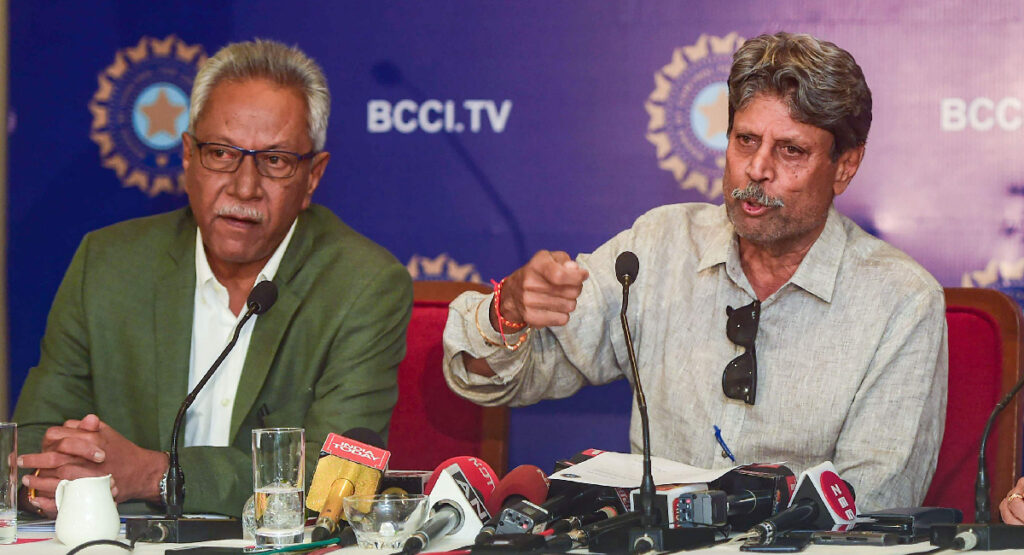The Legacy of Anshuman Gaekwad
Anshuman Gaekwad : I chose Anshuman Gaekwad when I did my research on the Indian cricket and I found him a legend of perseverance in the cricket world as a player and as a coach and as an administrator. Since Gaekwad was born into a family that has strong cricketing background it can be said that he has lived and breathed cricket. This paper focuses on his family history, education, career and any other related facets of his life.
Family Background
Anshuman Gaekwad is a former Indian cricketer and coach born on the 23rd of September, 1952 in Baroda, now in Gujarat. He comes from a famous family of cricketing family and this greatly helped to shape his destiny. His father was Datta Gaekwad, who was also a prominent captain of the Indian national cricket during the period of 1950s. He is a natural-born cricketer to represents India as he had this cricketing lineage from his father, and this made him have innate knowledge of the sport.

This man had a tremendous impact in shaping Anshuman’s career and the person largely responsible for that is Datta Gaekwad. Datta was a cricketer who played post-independence and therefore he was able to witness Indian cricket growing from the infantile stage. The lessons that he learned in the game as well as the strict environment that he enforced at home helped a lot in the foundation of Anshuman’s perception of cricket. The Gaekwad family which was liberal, especially in education and sports, made sure that Anshuman was given equal emphasis on education as well as sports.
Education
Anshuman Gaekwad had his earlier education in Baroda. He was as strict with his studies as he was with his exercise regime on the cricket ground. He finished his education from M. S. University of Baroda and did his B com. Education and sports presented the kid with certain dilemmas that he, however, solved diligently. Study in the university equipped him academically as well as made it possible for him to polish up on his cricket talents in a more competitive arena.
Early in his life, inter-university cricket talents in spheres were notable by his presence; he performed well in those tours to beckon selectors’ interest. These are some of the tournaments he frequently performed well in, and paved the way for the professional cricket inclusion. In addition, his schooling in commerce allowed him at maturity to officiate in the administrative aspect of the cricket as a coach and in other official capacities that he undertook.
Cricketing Career
Initial Games and house cricket
Anshuman Gaekwad has started playing in first class cricket for Baroda during the season of 1972-73. In domestic cricket he had several good performances but no extraordinary innings in his early years which pointed out his calliber as a good future opening batsman. He was branded as a technically correct batsman who exuded a lot of control while batting and it did not take Gaekwad very long to become an integral part of the Baroda set-up.
The crucial cameos he began scoring for his team in the Ranji Trophy which is the domestic cricket competition of India paved the way for him to be recognized as a budding superstar. Innings were long and Gaekwad was successfully able to exercise those by displaying a very sound technique when batting as well as when glued down the crease in the dugout, qualities that will form the basis of his international performance.
Debut in International Competition and His Style of Play
Anshuman Gaekwad represented India on Test cricket for the first time on January 27, 1975 against the West Indies side in Kolkata. He joined the side at a time when Indian cricket was in a process of building a new team and changing over with new talent. Anshuman Gaekwad was a normal start off for a weighted batting average but it exhibited a start of a solid career with focus on determination.
Anshuman Gaekwad bowled defensively, did not attempt any aggressive stroke play and most notably was very cautious while positioning his wicket. Unlike most of his counterparts his batting style was more of a ‘wall’ and he never let go of his aggressive singles for fours and sixes like many of his counterparts from India. Due to this, he was the best man suited for difficult conditions and particularly on Indian overseas tours where the team often faced disappointments.
Arguably the one of the high-point of Anshuman Gaekwad’s career happened during India’s tour to West Indies in 1976. During the Jamaica test, Anshuman Gaekwad showed incredible brave when he was batting on a hostile track against the powerful West Indian fast bowlers. Again, he was hit on the head region severally but still he went on to bat with a damaged jaw as a confirmation of his stamina. Ending on 81 in that innings, what he got was the appreciation of his colleagues and fans who came to realized the value of Gibbs.
Contributions and Memorable Performances
Anshuman Gaekwad the Indian right hand batsman and off spinner played 40 Test matches in his cricketing career and achieved 1,986 runs with the average of 30. To be precise, Smith notched up seven Test tons: two of these were converted hundreds and ten fifties. His Test best of 201 was made against Pakistan in Jalandher in 1983, a knock which took more than 10 hours to complete. This double century was an excellent demonstration of his stamina and psychological stability as it was made in worst possible conditions and against a potent bowling line up.
In One – Day internationals, Anshuman Gaekwad had a chance to play 15 matches where he scored 269 runs with the highest score of 78. Bangladesh one-day international career was not as successful and expansive as his Test career but he was a valuable customer at the top of the line up.
Out of this, one can recall how Gaekwad’s effort played a great role in making India scorch the Australian cricket team in Melbourne in the year 1977. In pursuit of a par score of 107 runs, Gaekwad bided his time well and indeed delivered the Boost-sponsored Indian team to their one of the most fondly remembered victories in Australia.
Retirement from International Cricket
Anshuman Gaekwad called it quit on international cricket in 1985 after having been associated with Indian cricket for a decade. They are it is worth to mention that apart from on-filed performances, he has been supportive of young talent in the Indian team as a mentor.
Coaching and Administrative Career
Transition to Coaching
Now it is clear that Anshuman Gaekwad went into coaching after his playing days were over and this was perhaps the most fitting job for him because it enabled him to impart his experience to the young generation of players. Being patient and thinking logically, he was perfect to be coached, and soon he proved that he was capable to become a dangerous coach of the Indian cricket.
Gaekwad had his early coaching tenure with the Baroda team and the talent nurturing was certainly felt with him. His achievements at the domestic level got him the job as the coach of the Indian national football team in 1997.
SU has the privilege of coaching the Indian National Team.
The author briefly discusses the period of Anshuman Gaekwad’s coaching career as a coach of the Indian national team establishing several successes and failures. He arrived at this post when Indian cricket was in search of a stable phase, especially in away series.
Among the many successes that should be attributed to Gaekwad as a coach one can mention the victory of Indian team in the 1998 Sahara Cup in Toronto with Pakistan. For this, the achievement in this series win was not only the fact that it was against Pakistan, India’s arch-enemies but also because it was one of the few instances where India had actually conquered the outsiders in the subcontinent.
Needless to say, there were new starts joining the Indian cricket team during Gaekwad’s reign more of whom later went into the Indian cricket hall of fame such as Tendulkar and Dravid. He was proven to have been involved in the development of such talents as well as offering them the right ingredients that could guarantee success at the senior level.
Nonetheless, Gaekwad encountered his fair share of problems during his coaching tenancy. The Indian team faced a lot of criticism for their fluctuating results over the years and more so, in the Test format of the game. Though conducting the Indian team was a prestigious task, the pressure built for Gaekwad to perform with the added pressure of media and negative judgments forced him to resign as the coaches of the team in the year 1999.
Role in Cricket Administration
The way that Anshuman Gaekwad remained connected with the cricket even after he got over with his coaching tenure is that he again took the administrative selector post. He was a national selector for the Indian cricket team and his presence as a Cricket commentator regarding the criterion during the phase of transition was helpful.
Gaekwad also had a responsibility of an administrator at the cricket fraternity, he was in various committees of the Indian BCCI. These aspects made him a persona of fame in the cricketing world because of his appreciation of the sport and effort towards the enhancement of the game.
Personal Life and Legacy
Cricket is not the only area where Anshuman Gaekwad has not flown high and his personal life also has been very simple. There is much to say about this man who has been unofficially famous for the fact that he is an obliging man who does not assume any personal airs towards people, and who is polite to everybody. It shows that his father Datta Gaekwad had some great influence over the formation of Sudhakar’s character to be disciplined, hardworking, and dedicated to Research.
That is why to date, Gaekwad does not come across as a very aggressive person rather he practices professional discretion shies away from publicity, and prefers that his work and his performances speak for him. It would be quite unfair to say that his contribution to Indian cricket can be termed as negligible, rather on the field as a player and off the field as a coach, he was a true team man.
For Gaekwad, the tradition that he served to Indian cricket was not just the runs that he or his team got to achieve its matches but all the changes he made to the players he trained and the structures that he introduced. He shall also be remembered as someone who helped Indian cricket during a time when the team was in the middle of a transition of a very crucial nature.
Conclusion
The life and cricketing history of Anshuman Gaekwad is a journey of commitment and determination. Right from being an aspiring cricketer in Baroda to being the coach of the Indian national team, Gaekwad has never looked at the game as anything other than a well-thought process of hard work and success. The services he provided to save Indian cricket as a player and a coach are surely unforgettable in the annals of the history of Indian cricket. Today, he is popular in the cricketing fraternity and his career largely continues to inspire the upcoming players.



